―
A harsh winter is looming after the extreme heatwaves
―
▪Reduce shower time to 5 minutes (Netherlands)
▪Ban air conditioning cooler that than 27℃ (Spain)
▪Shut off traffic lights in half the city during off-peak hours (Munich, Germany)
During the extreme heatwave of over 40℃ this summer, Europe has set the above restrictions. The reason? Power shortages.
Russia has cut back on natural gas and oil supplies to Europe, as the West responds with sanctions, holding Russia accountable for the war in Ukraine. In addition, Europe is experiencing an energy crisis due to increased demand on electricity in the recovery phase of the pandemic.
http://www.sunhakpeaceprize.org/kr/news/issue.php?bgu=view&idx=636
(See previous SunHak Peace Prize article on the recent heat wave)
To make matters worse, climate change has exacerbated the crisis. The French nuclear power plant is operating at only 50% capacity as it is difficult to supply cooling water owing to the drought.
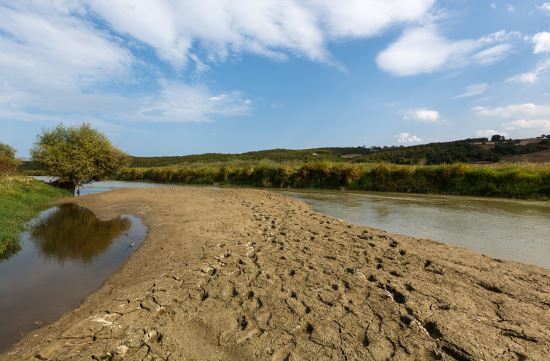
The energy emergency is still unresolved. Europe is more likely than ever to face a harsh winter coming.
―
Europeans groan as energy prices soar
―

Nations in Europe face an emergency as winter approaches.
UK has raised energy prices three times since a year ago. The UK's energy regulator announced in October it would raise the UK home energy bill cap by 80 per cent to around £5.64 per year (£3,549) from £3.13 per year (£1,971).
Germany and France expect to increase electricity rates tenfold next year. According to AFP, in both nations last year electricity cost 85 euros per megawatt-hour (1MWh), but Germany plans a hike to 850 euros and France to 1,000 euros. As a 4-person household uses about 3.6MWh per year, the annual electricity bill will top 3,000 euros.
Kosovo became the first European nation to initiate revolving power outages.
The Austrian government has set limits on electricity and gas usage based on the size of a house, and any household that exceeds these limits will be fined.
Overall, Europe has launched a movement to reduce energy. The EU has asked member states to voluntarily cut gas consumption by 15%.
The French government announced that it may implement a two-hour electricity cutoff every two hours if necessary, appealing to all citizens to curtail their energy use by 10% in the coming weeks and months.
In Germany, more and more households are installing fireplaces, and the price of firewood and related materials is also skyrocketing.
―
No more energy going to Europe
―
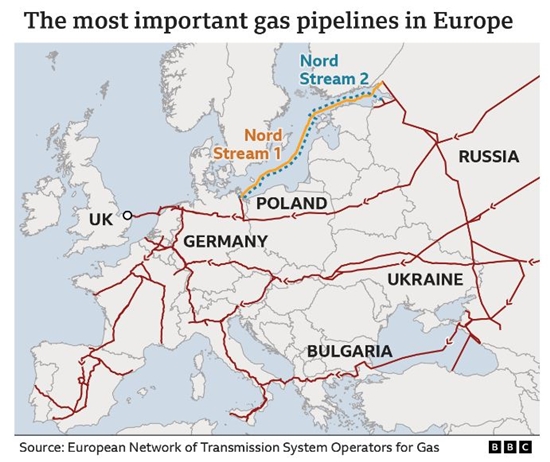
On September 2nd, when Europe announced it would impose a price cap on Russian energy due to a surge in energy costs, on the 5th, Russia shut down Nord Stream 1, the largest natural gas pipeline to Europe.
In the meantime, Russia has reduced the amount of gas for "technical reasons" such as maintenance, but now it has closed the gas pipeline, blatantly demanding the lifting of Russian sanctions from the West.
Russia's President Putin said, "If it conflicts with our interests, we will not supply anything." In addition to natural gas, he declared a halt to oil, coal and heating oil, and is weaponizing resources in earnest.
―
Why Europe Depends on Russia for Energy
―
Where does the confidence that Russia is getting stronger without yielding to various sanctions from the West comes from? That's the power of energy.
Since Europe needed a cheap and reliable source of energy, and Russia was financing its economy by selling energy to Europe, gas and oil trade between the two regions continued to grow.
In February of this year, CNBC reported on why Europe became dependent on Russia for energy.
https://www.cnbc.com/2022/02/24/why-europe-depends-on-russia-for-natural-gas.html
○ Foremost is depletion of the North Sea gas field. Europe was self-sufficient for natural gas in the 1960s and 1970s, but production decreased as the North Sea gas fields, chief gas producers in Britain and the Netherlands, were depleted.
○ The nuclear power cutback in Germany also played a role. Germany stopped all investment in nuclear power after the 2011 Fukushima nuclear accident in Japan. Now only 13% of Europe's energy comes from nuclear power.
○ Aggressive carbon reduction policies are also a major reason we became dependent on Russia for energy. Europe is reducing its use of coal with the goal of achieving carbon neutrality by 2050 and reducing carbon emissions by 55% by 2030. Since 2012, the EU has reduced its coal power generation by a third, and currently only about 20% of the EU's electricity comes from coal power plants. However, the share of renewables and biofuels in the EU is still only 18% of the total energy source. Europe itself is spurring decarbonization, but the lack of energy has been replaced by Russia's fossil fuels.
This energy vacuum was filled by Russian natural gas. There is one single reason: Russian gas is cheap and Russia has abundant reserves.
Thus dependence on Russian energy has grown even higher: Russia's natural gas accounts for 43% and crude oil accounts for 25% of European consumption.
The United States has long been wary of these deals. Energy is a matter directly related to security; the U.S. did not want to see Europe subject to Russia. Just as the U.S. feared, Russia has weaponized energy now, threatening global peace.
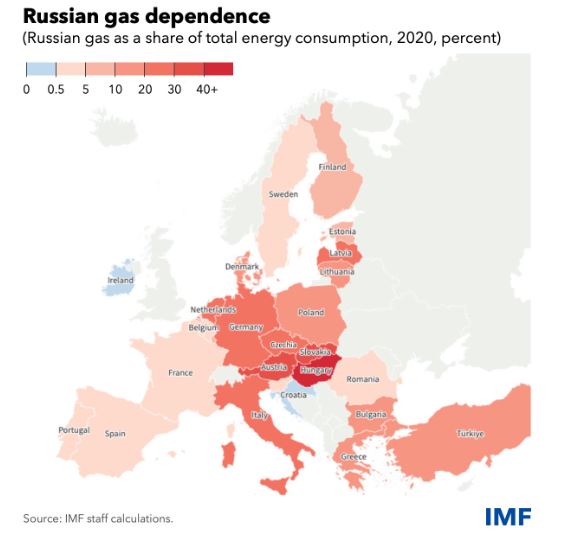
(Share of Russian gas in total energy consumption by EU nation. Source: IMF)
―
Europe is becoming split by energy
―

With soaring energy prices, Europe is in a very precarious situation.
On September 3, tens of thousands protested in Prague, outraged at rising energy prices. Some protesters call for Czech Republic to leave NATO and the European Union and import cheap gas through direct negotiation with Russia.
Protests over the economic crisis are predicted in around Germany. The voices of groups demanding reconciliation with Russia are gathering strength.
New York Times reported: "Leaders worry that an energy crisis and inflation could spark political unrest. There is growing concern that the public may reject government support for Ukraine as the cost of economic aid to Ukraine rises."
―
Energy-poor people will experience harsher winter
―
With the energy crisis as a lever, Europe is preparing for energy independence from Russia. European Commission's economic commissioner, Paolo Gentiloni, said on the 3rd that the EU is prepared to respond if Russia continues to weaponize energy.
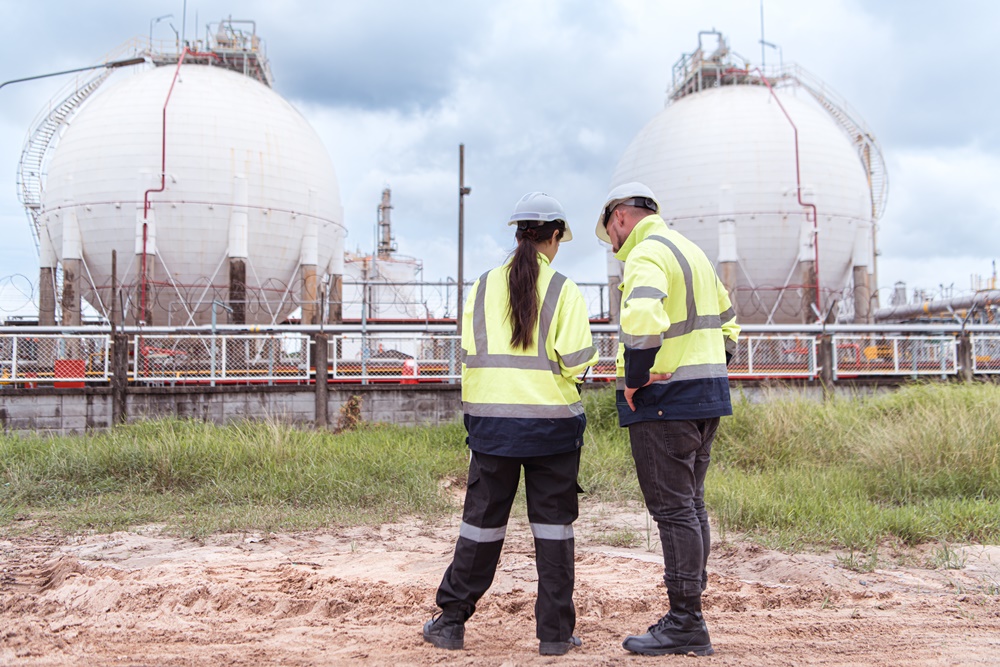
Germany, which relied the most on Russian natural gas, said it has "confirmed that Russia can no longer be trusted and has continued to take steps toward full independence from Russian energy." He pointed out that natural gas imports have been diversified to include northern Europe.
There is news that Germany and France have agreed to share electricity and gas to overcome the energy crisis, sending Germany's electricity to France and French gas to Germany. The gas pipeline link will be completed in a few months.
In June, the UK approved development of the Jackdaw gas field, the largest North Sea gas field, for energy security. The Jackdaw gas field, originally licensed in 1970, has only now received final approval.
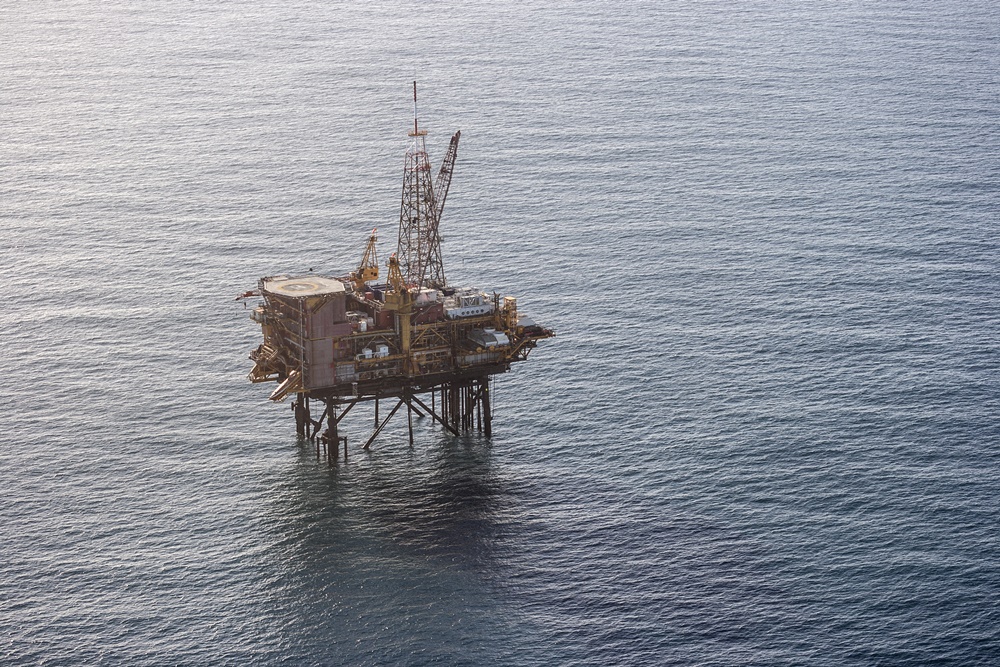
Despite all the efforts being made, it seems this winter will be very harsh for the energy poor as we move toward the cusp of winter.
The International Monetary Fund (IMF) released analysis data indicating that the impact would be different in Europe depending on income level and dependence on Russian gas.
For example, the sharp rise in fuel prices increases the cost of living for Finnish households in Northern Europe by 4%, while Estonian households in the Baltic states must pay an additional 15% to 25%. For reference, the average increase in cost of living for European households this year, by IMF estimates, is 7%.
Even within a country, the low-income brackets will suffer more. This is because poor households spend a higher percentage on electricity and gas. IMF estimates the proportional cost of living rise for the poorest 20% of households in Estonia and UK will be about twice that of the richest estates.
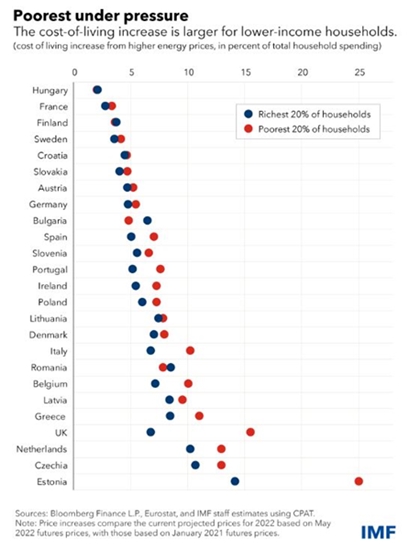
(Cost of living growth rate of top 20% and bottom 20% households by country)
https://blogs.imf.org/2022/08/03/how-europe-can-protect-the-poor-from-surging-energy-prices/
The Ukrainian people pummeled by war face even colder winters.
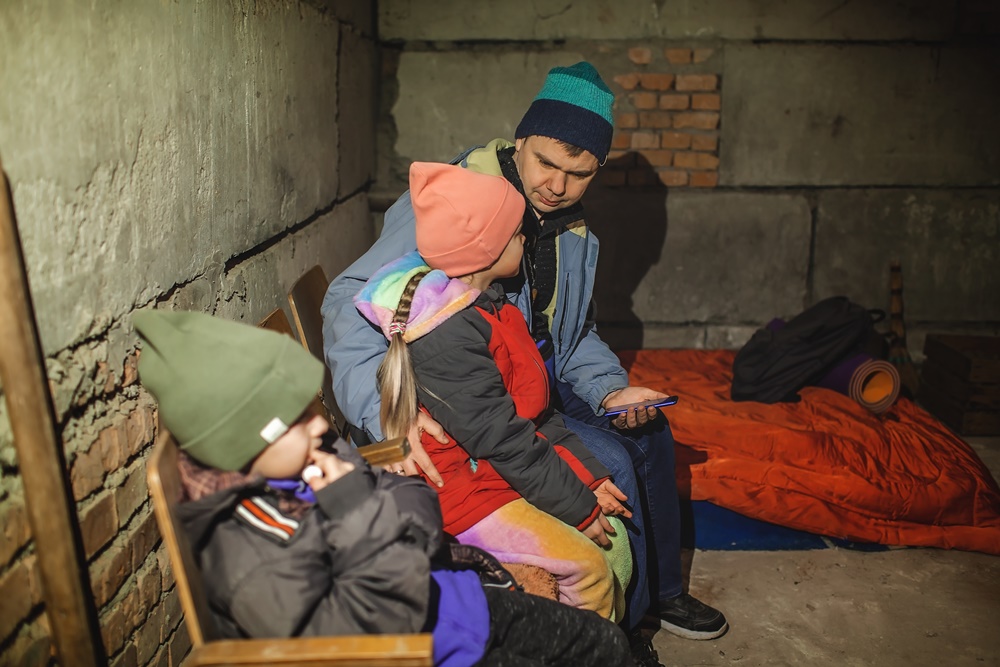
The CEO of Ukraine's state-run gas company said the heating period this year will come later and end earlier than usual, and the heating temperature will be lowered to 17-18 degrees, 4 degrees lower than usual. He urged Ukrainians to stock up on blankets and warm clothes in advance.
“The world is experiencing a truly global energy crisis for the first time in history. Europe's situation at the epicenter of energy market turmoil is especially precarious”
- President of International Energy Agency (IEA) Fatih Birol -
As such, Russia's "energy weapons" are as deadly as "nuclear weapons". And that weapon poses a threat not only to Europe, but to every country in the world that imports energy sources. This is because insecure energy supply chains and price fluctuations take a toll on the economy.
In June, the French monthly Le Monde Diplomatic published an article titled “Energy War, Who is the Final Winner”, predicting that the global energy supply and demand problem twisted by the Russian war will eventually cause great chaos around the world.
According to the Le Monde Diplomatique, “Europe is in the midst of an inflation crisis by giving up Russian fuel to pressure Russia, but the US seems to have decided the situation is not bad for its country. Meanwhile, India is stealing the Russian fuel that Europe has spurned, and the three East Asian countries are busy calculating the profit and loss between the US and Russia.”
In a situation where the Russia-Ukraine war, which has escalated into a long war, can be a great burden not only for the parties concerned but also for the whole world, there is a growing voice that ending the war through "peace negotiations" is the top priority.
Written by Sharon Choi
Director of Planning
Sunhak Peace Prize Secretariat

